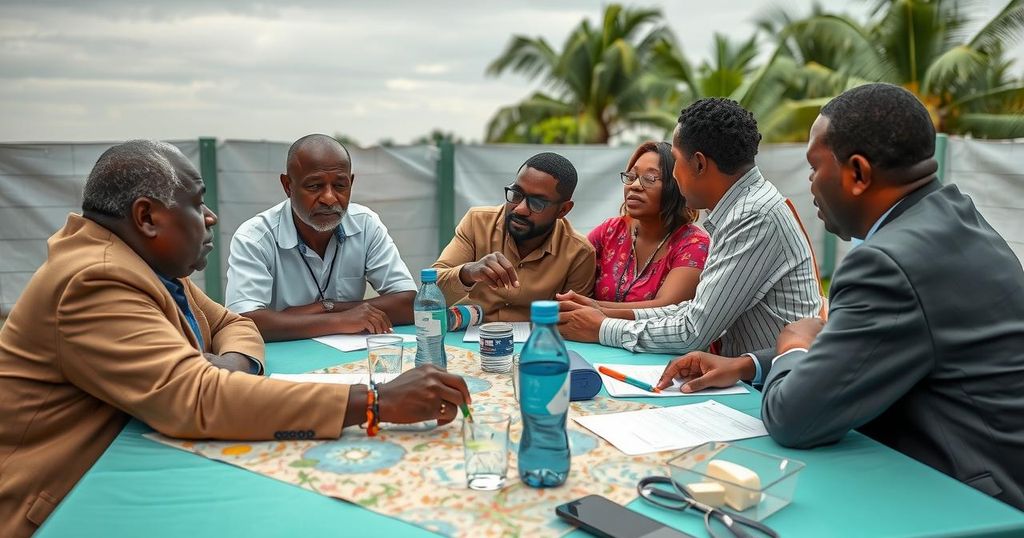The UN Security Council was briefed by Bintou Keita on ongoing violence in eastern DRC, particularly in North Kivu and Ituri, where armed groups threaten security. She emphasized the importance of regional cooperation and highlighted governance reforms aimed at stabilizing the country. The upcoming summit on December 15 aims to solidify peace efforts, while humanitarian challenges persist, exacerbated by climate issues and violence against civilians.
The United Nations Security Council convened to address the pressing need to mitigate the ongoing violence in eastern Democratic Republic of the Congo (DRC). UN Special Representative Bintou Keita informed the Council of the deteriorating security situation in the provinces of North Kivu and Ituri, exacerbated by the actions of multiple armed groups. Despite positive developments, she emphasized the necessity for continued international and regional cooperation to achieve enduring peace in the region, highlighting significant mediation efforts sponsored by Angola.
Ms. Keita underscored the forthcoming summit scheduled for December 15, which aims to unite leaders from Angola, Congo, and Rwanda in a concerted effort to substantiate the peaceful resolutions achieved thus far. She stated, “Although Angolan facilitation needs to enjoy the steadfast support of both the international and the regional community, local, provincial, national and regional processes should be dovetailed in order to foster lasting peace and stability.”
Additionally, the UN mission leader discussed the recent governance reforms undertaken by the DRC authorities to enhance societal welfare and stabilize the government, urging all stakeholders to collaborate to mitigate tensions regarding constitutional amendments. Progress has been made in ceasefire agreements with Rwanda, indicating a positive response to overarching peace efforts, despite the persistent threats posed by unyielding armed factions such as M23 and ADF.
Despite a temporary decline in attacks from some groups, violence continues to intersect alarmingly with the exploitation of natural resources, with ongoing challenges in civilian protection. Ms. Keita highlighted the necessity for coordination among Great Lakes nations to confront the illicit exploitation of resources, emphasizing the interconnectedness of conflict and economic factors.
The humanitarian crises stemming from security concerns have been worsened by climate change, with approximately 6.4 million individuals displaced in the DRC. Ms. Keita reported an encouraging funding status for humanitarian efforts, with substantial financial contributions improving the situation. Furthermore, she addressed the alarming rates of gender-based violence in the region, calling for proactive prevention measures and recognizing government initiatives aimed at victim support.
In her closing remarks, Ms. Keita gave voice to those in displacement, including women and persons with disabilities, who implore for meaningful investments in their future and sustained peace initiatives, reiterating the community’s united call for effective peace measures in the region.
The eastern regions of the Democratic Republic of the Congo, specifically North Kivu and Ituri, have been embroiled in conflict due to the activities of multiple armed groups, including M23 and ADF. Political instability and challenges in governance further complicate the situation, prompting international attention and intervention. The UN Stabilization Mission in the DRC (MONUSCO) plays a critical role in peacekeeping efforts, with ongoing support from regional players such as Angola and Rwanda in facilitating dialogue and conflict resolution. The humanitarian crisis exacerbated by armed conflict, climate change, and economic exploitation continues to affect millions, necessitating urgent and coordinated interventions.
In summary, the UN Security Council’s discussions highlighted the urgent need to address violence and instability in eastern DRC, emphasizing the importance of international cooperation and local engagement. Efforts towards peace and security can potentially be reinforced through upcoming summits and agreements, despite ongoing challenges posed by armed groups and humanitarian crises. The voices of vulnerable populations, particularly women and persons with disabilities, must remain central in the pursuit of lasting peace and stability in the region.
Original Source: news.un.org






